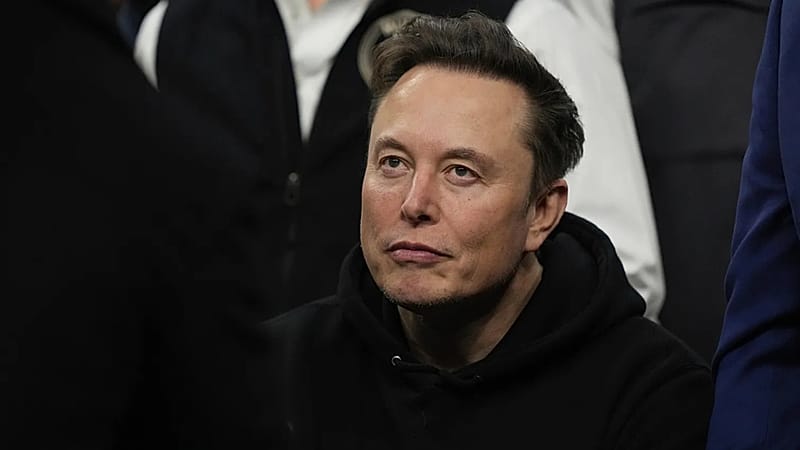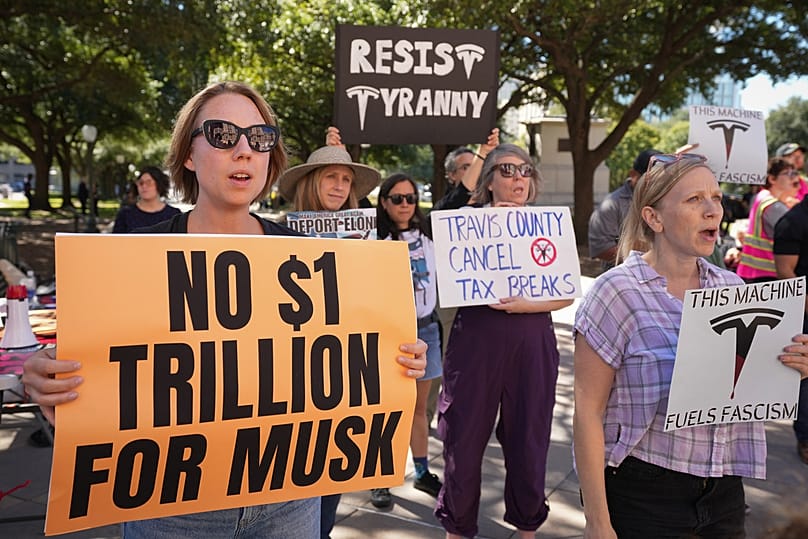Elon Musk could become world's first trillionaire in new Tesla compensation plan

Tesla shareholders approved a stock compensation package for CEO Elon Musk potentially worth $1 trillion (€865bn) if he meets performance targets over the next decade, meaning the world's richest man could also become the first ever trillionaire.
The vote passed with more than 75% in favour at the company's annual meeting on Thursday despite declining sales and criticism over unprecedented executive pay.
"Fantastic group of shareholders," Musk said after the vote, adding, "Hang on to your Tesla stock."
The approval came three days after European data showed Tesla sales plunged last month, including a 50% collapse in Germany.
Analysts have cautioned that Musk becoming the world's first trillionaire would require challenging operational and financial goals set by the board, including raising Tesla's stock market value almost sixfold.
Musk also has to deliver 20 million Tesla electric vehicles to the market over 10 years amid new, stiff competition, more than double the number since the founding of the company.
He is also expected to deploy 1 million of his human-like robots that he has promised will transform work and home — he calls it a “robot army” — from zero today.
Musk could add billions to his wealth in a few years by partially achieving these goals through intermediate steps that will hand him newly created stock in the company as he nears the ultimate targets.
That could help him eventually top what is now considered America’s all-time richest man, John D Rockefeller.
Guinness World Records estimates the oil titan was worth $630 billion (€545bn) in current dollars at his peak more than 110 years ago. Musk is worth $493 billion (€426.6bn), according to Forbes magazine.
'Huge win for shareholders'
Major institutional investors opposed the plan, including CalPERS, the largest US public pension fund, and Norway's sovereign wealth fund.
Corporate watchdogs Institutional Shareholder Services and Glass Lewis also recommended rejection, prompting Musk to call them "corporate terrorists" at a recent investor meeting.
"He has hundreds of billions of dollars already in the company, and to say that he won't stay without a trillion is ridiculous," said Sam Abuelsamid, an analyst at research firm Telemetry who has covered Tesla for nearly two decades. "It's absurd that shareholders think he is worth this much."
Critics argue the board remains too dependent on Musk, his behaviour has grown reckless, and the compensation exceeds reasonable bounds. Tesla faces declining sales, market share and profits largely attributed to Musk's involvement in conspiracy theories and political forays in the US and Europe, which drove customers away this year.
Supporters argue the package incentivises the Tesla CEO to focus on transforming the company into an AI powerhouse using software to operate self-driving vehicles and Tesla robots deployed in offices, factories and homes.
“This AI chapter needs one person to lead it and that’s Musk,” said financial analyst Dan Ives of Wedbush Securities. “It’s a huge win for shareholders.”
Investors voting for the pay had to consider not only this Musk promise of a bold, new tomorrow, but whether he could ruin things today: He had threatened to walk away from the company, which investors feared would tank the stock.
Tesla shares, already up 80% in the past year, rose on news of the vote in after-hours trading, but then flattened, basically unchanged, to $445.44 (€385.4).
For his part, Musk says the vote was not really about the money but getting a higher Tesla stake — it will double to nearly 30% — so he could have more power over the company.
He said that was a pressing concern given Tesla’s future “robot army” that he suggested he did not trust anyone else to control given the possible danger to humanity.
Other issues up for a vote at the annual meeting turned out to be wins for Musk, too.
Shareholders approved Tesla's investment in one of Musk’s other ventures, xAI. They also shot down a proposal to make it easier for shareholders to sue the company by lowering the threshold for filing. The current rule requires a minimum 3% stake.
The compensation plan awards new shares contingent on meeting board-established milestones, making the trillion-dollar valuation theoretical rather than guaranteed.


